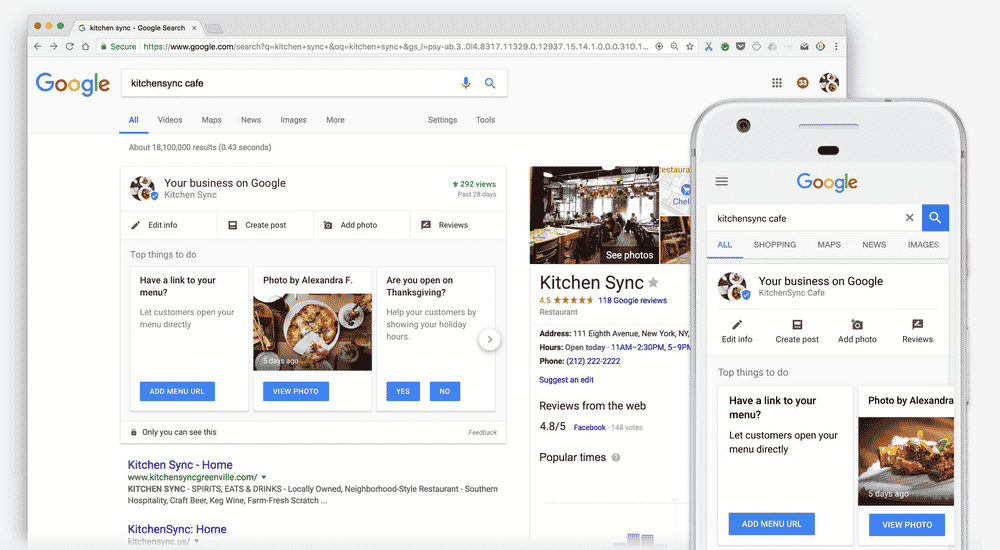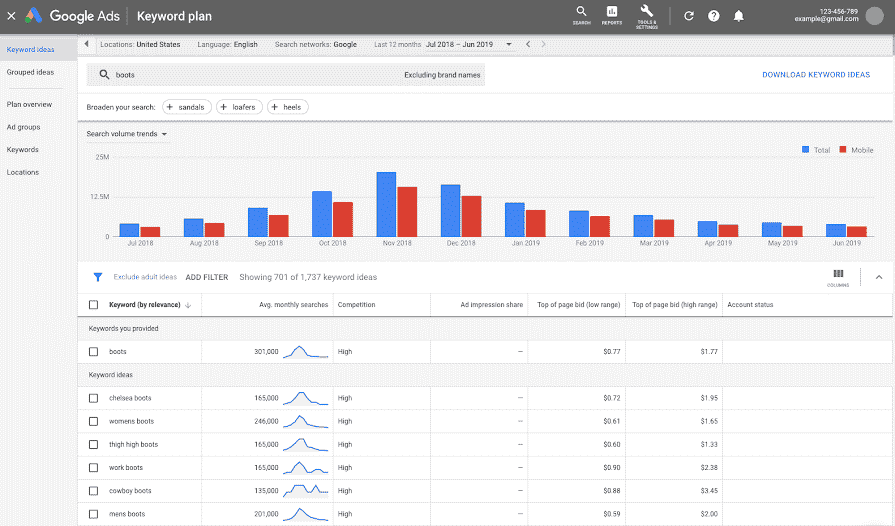Unlike their massive counterparts that function on a national level, many small businesses operate regionally and depend on local customers for survival. This makes local SEO a must, as those smaller businesses need to do everything they can to become visible on SERPS for specific locations.
Tips for Local Search Engine Optimization (SEO)
If you have a small business looking to attract customers in your area, use these local SEO tips to start bringing in traffic.
Set Up a Google My Business Account
What’s the best way to increase visibility in Google local search results and rank higher on Google Maps? Optimizing your Google listing or Business Profile.
You’ll need to create a Google My Business account that’s linked to your Business Profile to get started. Doing so will help verify that you’re the business owner so you can make several moves to optimize the listing.
You’ll be asked to provide several bits of information via the Google My Business account dashboard. Make sure it’s up-to-date and accurate, as that info will be added to your Business Profile, which is visible on Google Maps, local Google Search results, and the Google Search Knowledge Panel.
It’s essential to be as thorough as possible with your Business Profile on Google. Besides using updated information regarding your address, phone number, and website, include your hours of operation, a description of your products or services, types of payments you accept, and several images, including your company logo.
To get more movement on your Business Profile, ask for reviews from your customers. When they post a review, thank them and respond in a professional manner. If the review is negative, try to address any specific complaints.
Also, if you have any special offers, new products, or upcoming events, don’t forget to publish that information in posts via your Google My Business dashboard.
Read: Essential On-Page SEO Tips.
Focus On Local Keywords
If you’re a smaller business looking to make a splash via local SEO, it only makes sense that you should prioritize keywords that are relevant to your specific location. To find what customers are searching for in your area, use the Google Keyword Planner. It helps you pinpoint popular local keywords with ease since you can filter searches based on location. With your list of local keywords in place, inject them into your site’s copy, URLs, and meta content to get that SEO boost.
Another way to make use of local keywords is to reference famous landmarks in your area. For instance, if you have a restaurant in NYC, you could add a line in your content that says, “Enjoy fine dining just a few steps from Central Park.”
Be Location-Specific With Your About Us Page
The About Us page on your site is where you describe your company’s background and mission. It’s also a perfect place to mesh your mission with local keywords, landmarks, events, etc. For example, if you own a restaurant in Chicago, you could use the About Us page to mention how it’s a favorite hotspot each year during the St. Patrick’s Day Parade.
Create Multiple Location Pages, if Necessary
If your business has multiple locations in the area, make location pages for each that contain unique content. For instance, having three restaurants in the South Florida area (Miami, Fort Lauderdale, Boca Raton) would necessitate one location page for each. On each page, include specific information like the address, phone number, hours, parking, promotions, reviews, etc., as they’re bound to differ and give you even more chances to boost your local SEO.
Split Up Your Product and Service Pages
Instead of making one page listing all of your products or services, split them up into dedicated pages that are more descriptive and rich in local keywords. And if you have multiple locations, take this one step further by using location-based copy on each. For instance, if you have a boxing gym in New York with multiple locations, you should have pages for each, such as “Brooklyn boxing gym,” “Queens boxing gym,” “Manhattan boxing gym,” etc.
Structure Your Content Around Local Happenings
One of the best ways to catch a local customer’s attention is to create content on issues directly impacting them. For instance, you could make videos about local charities that your business is actively involved with. Are there any news stories, upcoming local events, or activities that are relevant to your business? Create some content on them.
Keep Voice Search in Mind
The popularity of voice search is growing as it’s much more convenient than typing, which helps users when they’re busy, on the go, and need quick answers to their questions. Keeping this in mind, you’ll have to optimize your site’s content for voice search.
One way to do this is to think of how people will speak into their devices versus typing. They’ll probably use a conversational tone, and your content should mirror that by including typical question starters like what, who, where, when, how, and why. They’ll probably also use more long-tail keywords with voice search, so be sure to include any that pertain to your business.
Think of all the questions customers may have about your business via voice search too. For example, they may want to know your hours of operation. Make a list of such questions and make sure all of that information is readily available.
Make Sure Your Website is Optimized for Mobile
It’s no secret that there’s a significant shift from desktop to mobile, and many local customers transform their smartphone searches into almost instant in-person visits. As such, make it a priority to optimize your website for mobile, as it’s essential for local SEO and SEO overall.
What helps with mobile optimization? For starters, you want your site to load quickly. Anything slower than three seconds is too slow. Second, be concise and to the point with your information and images, as smaller screens aren’t ideal for a ton of content. Third, increase your font size, so it’s easy to read. And lastly, check to make sure your site has an intuitive interface to provide a solid user experience.
Aim for Link Signals
What are link signals? They’re backlinks that point to your site, and they can play a big part in helping you rank highly in local search results.
Quality matters here, so to get the best backlinks, focus on creating great content on your site that others will want to link to and share. You can also look for local social media influencers and negotiate so they link back to you, or you can write guest blogs on highly reputable sites relevant to your industry.
Get Onto as Many Online Business Directories as Possible
An easy way to boost your visibility and local SEO is to get onto legitimate online business directories like Yelp, YellowPages, MapQuest, and Foursquare.
Be consistent and thorough when providing your business information, as you don’t want any discrepancies in terms of your name, address, phone number, website, etc. Don’t forget a thorough business description, either, as it can help to bring extra customers your way.
Read: Best Social Media Optimization Tips.
Ask For Reviews From Satisfied Customers
Even though it’s already been mentioned, getting reviews from satisfied customers is an absolute must for boosting your local SEO. Not only will those glowing reviews optimize your Google My Business account, but they’ll also convince new customers to give you a shot.
Here are some ideas to generate online reviews from your local customers:
- After completing a sale in person, ask for a review.
- Send a text or email after a purchase that surveys each customer’s level of satisfaction.
- After screening them and seeing that they’re satisfied, ask for a review.
How effective is a positive online review? So effective, that a BrightLocal survey found that 85 percent of customers follow online reviews as much as personal recommendations. In other words, it’s well worth your effort to ask for reviews, as they can help your business skyrocket.




